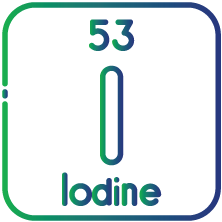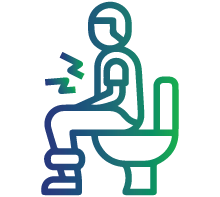
Iodine Test
Iodine Test
An iodine blood test is a diagnostic method that provides a numerical value of iodine in the body to help determine if this essential mineral is within the normal range for proper thyroid function. The measurement serves as an index that reflects an individual's adequate iodine intake from nutrition or the iodine overload from medications or supplements.
What is the Iodine Test Used For?
Your doctor might request an iodine test

To assess iodine deficiency or its excess in people having thyroid dysfunction and physical ailments

To evaluate iodine-related thyroid disorders, such as hypothyroidism or hyperthyroidism

To guide the implementation of appropriate interventions in cases of iodine deficiency or excess

To monitor iodine levels in patients administered iodine-containing medications or supplements for iodine-related conditions
Symptoms of Iodine Deficiency or Toxicity
Common signs and symptoms of iodine deficiency include

Severe tiredness and muscle weakness

Dry, flaky skin

Slow heartbeat

Unexpected weight gain

Enlarged thyroid or goiter

Irregular menstrual cycle

Pregnancy problems

Memory problems and issues with brain health
People with iodine toxicity may exhibit vague signs and symptoms but typically may experience

Nausea and vomiting

Belly pain and diarrhea

Brassy taste in the mouth

Confusion

Loss of consciousness
Preparation for Test
No special preparation is required to do an iodine blood test. But let your doctor know the medications and supplements you take.
Interpretation of Test Results
The iodine test results are typically reported in nanograms per milliliter (ng/mL) and may vary depending on age, gender, and pregnancy status.
What the levels of iodine in the blood mean is provided in the table below:
|
Levels of Iodine |
Interpretation |
|
Less than 40 ng/ml |
Indicates mild to severe iodine deficiency, could lead to hypothyroidism |
|
40-92 ng/mL |
Normal |
|
80 -250 ng/mL |
Indicates Hyperthyroidism |
|
Greater than 250ng/ml |
May indicate iodine overload |
FAQs
Who should get an Iodine test?
Anyone experiencing symptoms associated with thyroid disorders can get an Iodine test. It may also be done as part of an overall body health checkup and monitor exposure to iodine.
Is the iodine blood test accurate?
Yes, an iodine blood test determines iodine levels accurately. However, it is important to consult a physician to understand what the results actually mean and the steps one must take subsequently based on individual circumstances.
What does the abnormal iodine test result mean?
If your iodine blood test reveals abnormal results, it's essential to consult a physician to determine the possible causes and find appropriate treatment options.
- Consuming too little or too much dairy products, seafood, iodized salt, and certain seaweeds can affect iodine levels.
- Some medications, such as amiodarone or potassium iodide supplements, can increase iodine levels in the blood.
- Exposure to iodine-based dyes during medical imaging can increase iodine levels in your body.
- Living in areas with naturally low iodine levels in the soil and water can lead to iodine deficiency.
How often should I get an Iodine test?
The frequency of iodine testing depends on individual circumstances and the doctor's recommendation.
How is the iodine test related to thyroid function tests?
The iodine test directly relates to thyroid function tests since abnormal iodine levels influence the production of thyroid hormones, leading to thyroid disorders.

